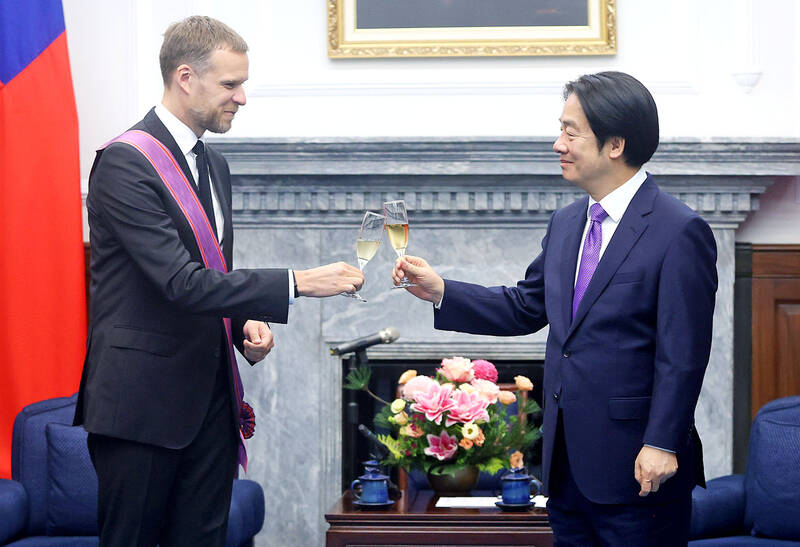President William Lai (賴清德) yesterday presented the Order of Brilliant Star with Grand Cordon to former Lithuanian minister of foreign affairs Gabrielius Landsbergis in recognition of his outstanding contributions to Taiwan-Lithuania relations and to thank him for standing with Taiwan to uphold democratic values.
The friendship between Taiwan and Lithuania would hopefully inspire other nations to support democracy and freedom in the face of authoritarianism, Landsbergis said during the meeting with Lai at the Presidential Office in Taipei.
During the COVID-19 epidemic, Lithuania was the first European nation to donate vaccines to Taiwan, an act of kindness that Taiwan “will never forget,” Lai said.

Photo: CNA
The Taiwan Representative Office in Lithuania in the capital, Vilnius, is also the first in Europe to use the name “Taiwan,” with the two nations having seen “fruitful results in such fields as semiconductors, laser technology, finance and medicine,” he said.
Lai said that he hopes to increase bilateral exchanges in trade, science and technology, and culture, as “together, we can contribute even more to our nations’ development, and to peace and prosperity throughout the world.”
Images of the Taiwanese struggle for democracy displayed at the Presidential Office’s permanent exhibition resonate with Lithuania’s own experiences as a former part of the Russian Empire in the 19th century, when it staged many revolutions and revolts alongside Poland and Belarus in the pursuit of freedom, Landsbergis said.
“Not even one generation has passed since these events took place here in Taipei or similar events took place in Vilnius,” he said.
Many of Lithuania’s policymakers are former freedom fighters or stand on the shoulders of their parents who fought for democracy, he said, recalling the 1864 revolution slogan: “For our freedom and yours,” which inspires them to “continue to fight for their freedom while helping Taiwanese fight for [theirs].”

AGING: As of last month, people aged 65 or older accounted for 20.06 percent of the total population and the number of couples who got married fell by 18,685 from 2024 Taiwan has surpassed South Korea as the country least willing to have children, with an annual crude birthrate of 4.62 per 1,000 people, Ministry of the Interior data showed yesterday. The nation was previously ranked the second-lowest country in terms of total fertility rate, or the average number of children a woman has in her lifetime. However, South Korea’s fertility rate began to recover from 2023, with total fertility rate rising from 0.72 and estimated to reach 0.82 to 0.85 by last year, and the crude birthrate projected at 6.7 per 1,000 people. Japan’s crude birthrate was projected to fall below six,

US President Donald Trump in an interview with the New York Times published on Thursday said that “it’s up to” Chinese President Xi Jinping (習近平) what China does on Taiwan, but that he would be “very unhappy” with a change in the “status quo.” “He [Xi] considers it to be a part of China, and that’s up to him what he’s going to be doing, but I’ve expressed to him that I would be very unhappy if he did that, and I don’t think he’ll do that. I hope he doesn’t do that,” Trump said. Trump made the comments in the context

SELF-DEFENSE: Tokyo has accelerated its spending goal and its defense minister said the nation needs to discuss whether it should develop nuclear-powered submarines China is ramping up objections to what it sees as Japan’s desire to acquire nuclear weapons, despite Tokyo’s longstanding renunciation of such arms, deepening another fissure in the two neighbors’ increasingly tense ties. In what appears to be a concerted effort, China’s foreign and defense ministries issued statements on Thursday condemning alleged remilitarism efforts by Tokyo. The remarks came as two of the country’s top think tanks jointly issued a 29-page report framing actions by “right-wing forces” in Japan as posing a “serious threat” to world peace. While that report did not define “right-wing forces,” the Chinese Ministry of Foreign Affairs was

PREPAREDNESS: Given the difficulty of importing ammunition during wartime, the Ministry of National Defense said it would prioritize ‘coproduction’ partnerships A newly formed unit of the Marine Corps tasked with land-based security operations has recently replaced its aging, domestically produced rifles with more advanced, US-made M4A1 rifles, a source said yesterday. The unnamed source familiar with the matter said the First Security Battalion of the Marine Corps’ Air Defense and Base Guard Group has replaced its older T65K2 rifles, which have been in service since the late 1980s, with the newly received M4A1s. The source did not say exactly when the upgrade took place or how many M4A1s were issued to the battalion. The confirmation came after Chinese-language media reported